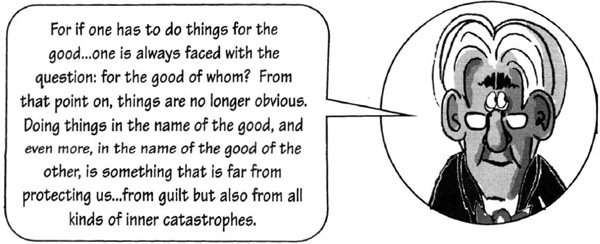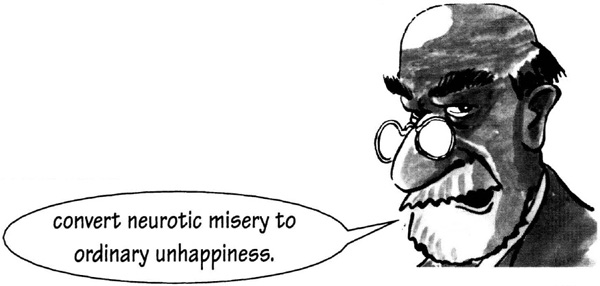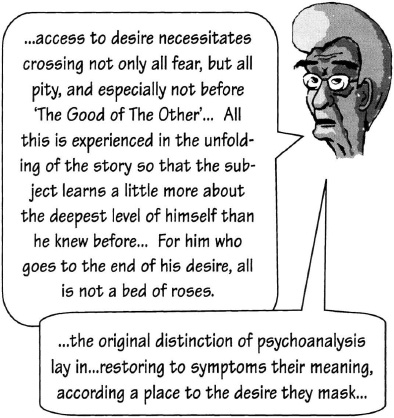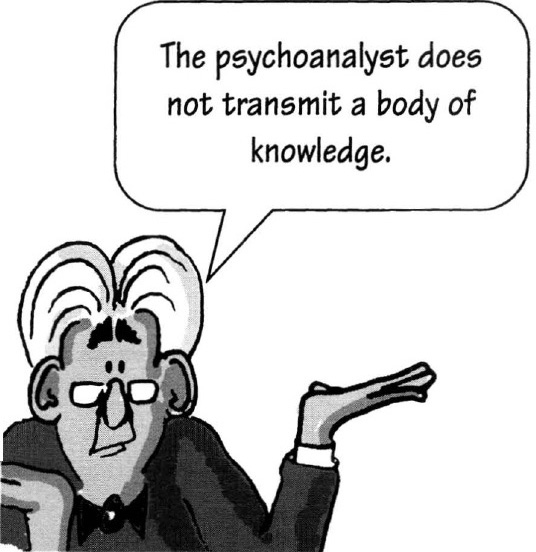CHAPTER 11
WHAT’S THE GOOD OF PSYCHOANALYSIS?
If you are analysed you will come to revalue and review what ‘good’ and ‘bad’ mean for you. But good or bad are the stuff of ethics, along with the questions and answers as to what we ‘ought to do’. Lacan argued that ethical considerations can only be properly made after desire has been identified. Before you can place a value on things, or decide what is good or bad you first have to know your desire. So the purpose of analysis is the analysis of purpose. You have to know what your desires are before you can begin to get clear about your values. A version of this idea is used in courts of law where the question of the accused’s desire is often the most important issue for a judge or jury:

So ethical issues can only be decided after the main issues of desire have been clarified. The question as to what is ‘good’ or ‘bad’ is an ethical question, and ethical questions can only be properly considered once you have got clear about the desire that is at stake. And that question, the question of desire —‘What is it?’— is the question that psychoanalysis seeks to answer. So psychoanalysis is a special tool that allows one to make ethical judgements. Here is an illustration:
If these people had been psychoanalysed, some might have come to see that ‘ethical issues’ were not foremost for them, but that they were instead trying, above all, to mislead themselves about their own desire, about their own repressed homosexuality; there is little doubt that many homophobes are fighting above all against recognition of their own homosexuality.
When you ore psychoanalysed you do not come to see the world ‘for what it is’, without error, as the ego psychologists claim, but you can speak your own desire more dearly, and act on it. Psychoanalysis is a technique and theory for clarifying and purifying desire. Once you can identify your desire, you can make ethical assessments. But prior to knowing your desire you necessarily act in ignorance, unable to make informed ethical judgements. So psychoanalysis can allow a knowledge of desire that then facilitates the judgment ‘good’ or ‘bad’.

Sometimes. Psychoanalysis does not claim that ‘when you discover your desire, all your suffering will cease and you will become happy’. The function of psychoanalysis, according to Freud was to:

Psychoanalysis, unlike religion, does not offer salvation. Indeed, Lacan thought that when people recognise and act on their desire, their life is often difficult and conflict-ridden, but in quite a different way. The new way is accepted by the subject as the price to pay, so that their suffering can take a different form:

Following your desire is not easy. There is often a high cost, as we saw in the case of the alcoholic man who was married, and then discovered that he was homosexual. It is the fear of paying a high cost that often insists on desires being kept unconscious and safely hidden. Psychoanalysis can sometimes reduce suffering, but only at the price of the subject giving up some enjoyment, some of the jouissance of their symptoms. So it is not unusual for someone to complete an analysis, and then to decide to keep their symptoms!
One man had been going to the same bar for a few years. One evening he urinated against the bar. And the next day he did the same. Because the barman had got to know him well he made the suggestion that he consult a psychoanalyst. So the unfortunate man underwent a lengthy and expensive analysis, and some years later returned to the bar, said ‘Hello’ to the barman, and urinated against the bar. The barman was astonished ‘I don’t understand; you’ve been psychoanalysed, but you’re still peeing on my bar?’ ‘Yes’ he said, ‘I’ve been analysed, now I know why I do it’.
Psychoanalysis has no behavioural goals, so it is not a ‘cure’ for difficult or antisocial people. It does not aim to make you nicer, more successful, less inhibited, or ‘better adjusted to reality’.
While psychoanalysis is uniquely privileged in working with desire, it is not the only source of information on this question. It is possible to learn something about your desire through everyday life, gardening, love affairs, or zen meditation...


But psychoanalysis is not something that can be taught like any other form of knowledge. You can study medicine to be a doctor, or mechanics to become a mechanic but to be a psychoanalyst you must — yourself— be analyzed.
Psychoanalysis is a special technique for finding your essence, the lack, division and desire that has made you live your life in the way that you do. What you actually do with this fundamental truth about yourself is not a psychoanalytic issue. Psychoanalysis has no prescriptive rules or political schemes. It does not tell you what to do, but offers a unique appreciation of what it has meant for you to be that subject.
But there are some who have had terrible lives and much suffering, who cannot work or love, for whom psychoanalysis has allowed revolutionary and dramatic changes in their lives, almost miracles.
WHAT DOES PSYCHOANALYSIS HAVE TO SAY ABOUT THE MEANING OF LIFE?
In psychoanalysis there is an answer to this question that is neither grandiose nor trivial: ‘meaning’ is understood as a function of language, the property of words, as the passage and rewriting of the signifier. So the meaning of life is the life of meaning. Psychoanalysis aims for an understanding of the meaning of a subject’s life, through a study of his signifiers. At the end of analysis a subject can speak clearly about the meaning of his life and is then free to follow his desire, if he has the courage.

 t is now widely thought that much past and present legislation against homosexuals was produced by people who were themselves struggling to repress their own homosexual desires. Homophobic legislators took what they claimed was ‘an ethical stance’, and argued that they were ‘for the good’ — ‘for the good heterosexuals’, and ‘against the bad homosexuals’.
t is now widely thought that much past and present legislation against homosexuals was produced by people who were themselves struggling to repress their own homosexual desires. Homophobic legislators took what they claimed was ‘an ethical stance’, and argued that they were ‘for the good’ — ‘for the good heterosexuals’, and ‘against the bad homosexuals’.